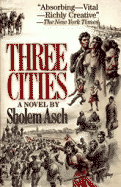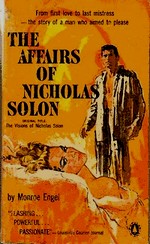Book One. Chapter I. The Capital

From the Warsaw Station a long trail of little one-horse sledges lined with straw was slowly making its way through the soft, watery slush of the Vosnessensky Prospect towards Issakievsky Square. The sledges straggled in several long, apparently endless processions. The sheepskin coats of the drivers, some of whom had clouts tied round their feet with pieces of string, while others wore felt boots, were steaming like the flanks of their spirited black horses. Men and beasts breathed heavily as they struggled through the dirty gray gutters flowing along the ice-covered bridges in the dark thick fog which, rising from the canals, was gradually enveloping the whole of Petersburg.
Now and then a light troika flew through the slow-moving lines of sledges. The swift horses splashed the drivers from head to foot with the mud that flew from their hoofs, and gave them something to swear at. The drivers took liberal advantage of the opportunity; when they were not pelting each other with free samples from their stores of abuse, they addressed their horses, bestowing on them at one moment the tenderest terms of endearment and the next cursing them to the tenth generation with the most fluent oaths.
These little one-horse sledges were conveying the riches of the south into the capital of the Czar. The plains of Champagne sent their choicest vintages, of which Petersburg consumed more than all the rest of the world. Closed wagons bearing roses, carnations and violets were brought from the Riviera to the metropolis of Nicholas the Second; crates of the earliest fruits from the forcing houses; exquisite perfumes, soaps, and other cosmetic accessories from France’s best factories; rare jewels; cooling mineral waters: in short, the finest and most expensive luxuries that Europe possessed came in prodigious abundance to the Warsaw Station and thence to the capital. From the Warsaw Station the riches of the whole world streamed into Petersburg; the other railway stations of the city received and distributed the wealth of Russia itself.
In a narrow side-street off the Vosnessensky Prospect, through which the one-horse sledges were now lugging their crates and baskets of wine, fruits and flowers, stood an old and spacious building. It dated from the time of Alexander I and was built in the typical Petersburg Empire style. The yellow-washed facade had two entrances which were guarded day and night by liveried doorkeepers. The front of the gigantic building, which was so long as to be almost uncanny, stretched nearly to the end of the street. The side, which faced on another cross-street, was almost as long. Yet there were only three families lodged in this huge structure. The whole of the ground floor was reserved for a general’s widow, to whom the house belonged. The first floor was rented by a rich land-proprietor, and the top floor–that was occupied by the advocate, Solomon Ossipovich Halperin.
The corridor that led to the reception-rooms of the celebrated advocate had been packed with clients ever since three in the afternoon. It was a corridor such as was often to be seen in Petersburg, well lighted and heated, with long rows of sofas covered with red plush, and large Empire mirrors on the walls. It was pleasant to wait in that corridor, and clients who had secured admittance by bribing the attendants waited there until four o’clock, so that, when the advocate’s reception-rooms in front were thrown open, they might be among the first to enter.
And when the tall doors opened, the great rooms soon swarmed with human beings–peasants, land-proprietors, Jews. From every province of the Russian Empire came a stream of litigants; people who had been wronged, who were oppressed by the Czar’s officials, goaded by the pitiless laws, persecuted by judges and attorneys, tortured by the petty ill-will of local authorities–they all sought refuge in the capital and there appealed for justice to the supreme court or the highest State officials. Petersburg, the seat of the Czars and their officers, mistress of a hundred million human beings and tens of thousands of people drawn from the remotest corners in the whole breadth of Russia, pilgrims to this European Mecca in search of justice, safety and protection, concessions and privileges; for all affairs concerning the boundlessly great and rich empire of Russia were decided in Petersburg alone. And quite a respectable proportion of the pilgrims filled the corridors and the official and private reception-rooms of the advocate Halperin. For, though a Jew, Halperin was celebrated far and wide in Russia for his acuteness, his eloquence (he was counted one of Russia’s best orators) and his influential connections.
Editor’s Comment
I struggled with Three Cities for months. It looks, at first glance, to be a terrific story: the epic saga set in St. Peterburg, Warsaw, and Moscow in the years before and during the Russian Revolution. It has a cast of thousands, or at least hundreds, from millionaire railroad tycoons to homeless beggars, from Hassidic Jews to anti-semitic Russian noblemen. There are love affairs, jealousies, greedy schemes, worker’s strikes, famines, troika rides on moonlit nights.
And Asch has the capacity, even when filtered through double translation (from Yiddish to German to English) of producing passages remarkably vivid color and characterization. Every few pages, there are wonderful sketches in which he takes best advantage of the freedom of a long and complicated novel, taking time to inventory the residents of a Warsaw tenement or to lead us through the thoughts of a Russian estate owner on his way to his mistress in Moscow. For these passages, the novel rises to great heights of accomplishment.
Unfortunately, in between, the reader is subjected to endless and repetitive dialogues about the meaning of life and the value of life and whether the meaning of life has any purpose and whether a purposeful life has any value and whether the value of purpose is…. If you’re starting to doze off at this point, you’re not alone. After one too many of these discussions, you simply gives and skip on to the next descriptive passage.
The problem is with the protagonist. After putting so much energy into scene-setting, philosophical dialogues, and sketches of peripheral characters, Asch seems to have none left for his lead character, Zachary Mirkin. Mirkin is a young lawyer, left motherless at a young age, who discovers in his teens that he is a Jew. His father, a powerful industrialist, has worked hard to distance himself from his Jewish roots. The narrative follows Mirkin as he grows disenchanted with the materialism of Czarist St. Petersburg, seeks a mission in the ghettos of Warsaw and Lodz, joins a revolutionary movement, ends up in the midst of the Bolshevist take-over in Moscow, then finally abandons the revolution and returns to Warsaw. All around Mirkin Asch colors in a rich setting of places, smells, sounds, and people. Mirkin himself, however, is a void:
In this building filled with unfettered energy, Comrade Mirkin walked about with hesitating steps like a sleep-walker, as if he were in a dream. Everything seemed to him real and unreal at the same time, clear and yet indistinct; he knew what has happening round him, and again did not seem to know.
This comes on page 626, when the Bolshevisks and Whites are battling in the streets of Moscow. Meanwhile, our hero is wandering around in a fog, which is where he’s been since being introduced on page 18. And there are still 230 pages left to go! One academic has argued that most critics fail to understand the real character of Zachary Mirkin, the brooding protagonist of Asch’s novel. His struggle shows us, so the writer claims, that the hardest path in life is that of sticking to one’s beliefs. But Zachary spends virtually the whole novel wondering what he really believes. A good bitch-slapping is what the boy needs, and by the end, the reader is ready to give him one.
I’ve never thought much of Reader’s Digest condensed, but in the case of Three Cities, the approach has its merits. Chuck the soul-seeking and the clueless protagonist and preserve the scenery and supporting players, and you have the makings of a rich and satisfying read.
Locate a Copy
Three Cities, by Sholem Asch
Translated by Willa and Edwin Muir
New York: G.P. Putnam’s Sons, 1933
 Monroe Engel has been a novelist, critic, editor, and teacher for the last 50 years and I picked one of his novels at random to see what kind of work such a multi-talented writer could produce. The Visions of Nicholas Solon (retitled The Affairs of Nicholas Solon for its paperback release to match its suggestive cover) tells the story of a college instructor in his mid-thirties and his struggle to find happiness.
Monroe Engel has been a novelist, critic, editor, and teacher for the last 50 years and I picked one of his novels at random to see what kind of work such a multi-talented writer could produce. The Visions of Nicholas Solon (retitled The Affairs of Nicholas Solon for its paperback release to match its suggestive cover) tells the story of a college instructor in his mid-thirties and his struggle to find happiness.
